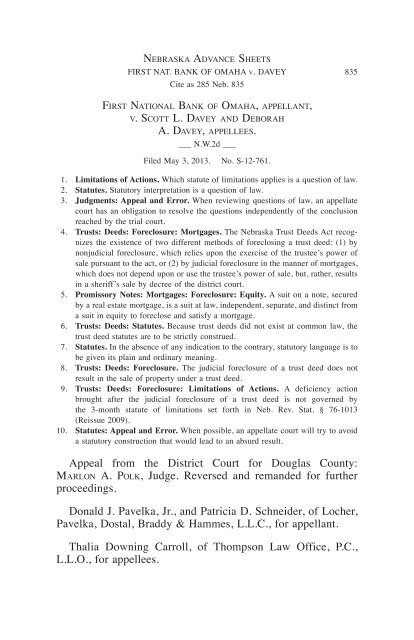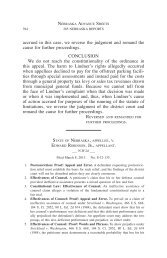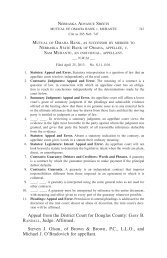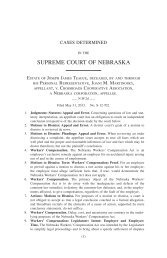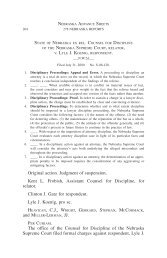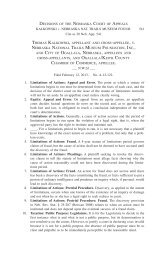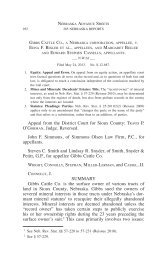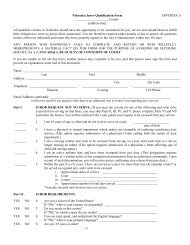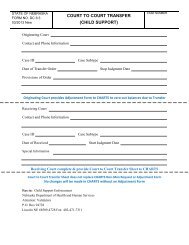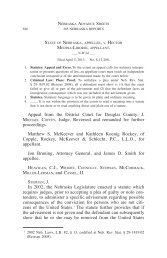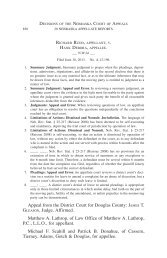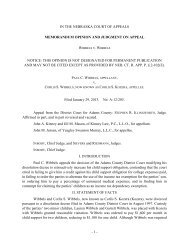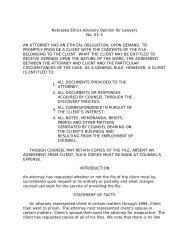First Nat. Bank of Omaha v. Davey - Nebraska Judicial Branch
First Nat. Bank of Omaha v. Davey - Nebraska Judicial Branch
First Nat. Bank of Omaha v. Davey - Nebraska Judicial Branch
You also want an ePaper? Increase the reach of your titles
YUMPU automatically turns print PDFs into web optimized ePapers that Google loves.
<strong>Nebraska</strong> Advance Sheets<br />
FIRST NAT. BANK OF OMAHA v. DAVEY 835<br />
Cite as 285 Neb. 835<br />
<strong>First</strong> <strong>Nat</strong>ional <strong>Bank</strong> <strong>of</strong> <strong>Omaha</strong>, appellant,<br />
v. Scott L. <strong>Davey</strong> and Deborah<br />
A. <strong>Davey</strong>, appellees.<br />
___ N.W.2d ___<br />
Filed May 3, 2013.<br />
No. S-12-761.<br />
1. Limitations <strong>of</strong> Actions. Which statute <strong>of</strong> limitations applies is a question <strong>of</strong> law.<br />
2. Statutes. Statutory interpretation is a question <strong>of</strong> law.<br />
3. Judgments: Appeal and Error. When reviewing questions <strong>of</strong> law, an appellate<br />
court has an obligation to resolve the questions independently <strong>of</strong> the conclusion<br />
reached by the trial court.<br />
4. Trusts: Deeds: Foreclosure: Mortgages. The <strong>Nebraska</strong> Trust Deeds Act recognizes<br />
the existence <strong>of</strong> two different methods <strong>of</strong> foreclosing a trust deed: (1) by<br />
nonjudicial foreclosure, which relies upon the exercise <strong>of</strong> the trustee’s power <strong>of</strong><br />
sale pursuant to the act, or (2) by judicial foreclosure in the manner <strong>of</strong> mortgages,<br />
which does not depend upon or use the trustee’s power <strong>of</strong> sale, but, rather, results<br />
in a sheriff’s sale by decree <strong>of</strong> the district court.<br />
5. Promissory Notes: Mortgages: Foreclosure: Equity. A suit on a note, secured<br />
by a real estate mortgage, is a suit at law, independent, separate, and distinct from<br />
a suit in equity to foreclose and satisfy a mortgage.<br />
6. Trusts: Deeds: Statutes. Because trust deeds did not exist at common law, the<br />
trust deed statutes are to be strictly construed.<br />
7. Statutes. In the absence <strong>of</strong> any indication to the contrary, statutory language is to<br />
be given its plain and ordinary meaning.<br />
8. Trusts: Deeds: Foreclosure. The judicial foreclosure <strong>of</strong> a trust deed does not<br />
result in the sale <strong>of</strong> property under a trust deed.<br />
9. Trusts: Deeds: Foreclosure: Limitations <strong>of</strong> Actions. A deficiency action<br />
brought after the judicial foreclosure <strong>of</strong> a trust deed is not governed by<br />
the 3-month statute <strong>of</strong> limitations set forth in Neb. Rev. Stat. § 76-1013<br />
(Reissue 2009).<br />
10. Statutes: Appeal and Error. When possible, an appellate court will try to avoid<br />
a statutory construction that would lead to an absurd result.<br />
Appeal from the District Court for Douglas County:<br />
Marlon A. Polk, Judge. Reversed and remanded for further<br />
proceedings.<br />
Donald J. Pavelka, Jr., and Patricia D. Schneider, <strong>of</strong> Locher,<br />
Pavelka, Dostal, Braddy & Hammes, L.L.C., for appellant.<br />
Thalia Downing Carroll, <strong>of</strong> Thompson Law Office, P.C.,<br />
L.L.O., for appellees.
<strong>Nebraska</strong> Advance Sheets<br />
836 285 NEBRASKA REPORTS<br />
Heavican, C.J., Wright, Connolly, Stephan, Miller-Lerman,<br />
and Cassel, JJ.<br />
Cassel, J.<br />
INTRODUCTION<br />
In this appeal, we must determine whether the special<br />
3-month statute <strong>of</strong> limitations on actions for deficiency set<br />
forth in the <strong>Nebraska</strong> Trust Deeds Act (Act) 1 applies where a<br />
lender elects to judicially foreclose upon the real estate. We<br />
conclude that the special limitation applies only where the<br />
property has been sold by exercising the power <strong>of</strong> sale set<br />
forth in the trust deed. As we will explain, our conclusion follows<br />
from our previous decisions under the Act, is faithful to<br />
the plain language <strong>of</strong> the statute, avoids absurd results, and is<br />
consistent with decisions in other states. We therefore reverse<br />
the contrary decision <strong>of</strong> the district court.<br />
BACKGROUND<br />
In 2009, in exchange for a loan <strong>of</strong> money, Scott L. <strong>Davey</strong><br />
and Deborah A. <strong>Davey</strong> gave a promissory note to the <strong>First</strong><br />
<strong>Nat</strong>ional <strong>Bank</strong> <strong>of</strong> <strong>Omaha</strong> (<strong>First</strong> <strong>Nat</strong>ional) and secured the loan<br />
with a trust deed upon specific real property. When the <strong>Davey</strong>s<br />
defaulted on the note, <strong>First</strong> <strong>Nat</strong>ional initiated foreclosure proceedings<br />
in the district court for Washington County, <strong>Nebraska</strong>.<br />
Pursuant to a decree from that court, the property was sold by<br />
sheriff’s sale on April 28, 2011. The district court confirmed<br />
the sale by an order entered on May 17.<br />
Because the proceeds <strong>of</strong> the sheriff’s sale were not sufficient<br />
to cover the full amount <strong>of</strong> the loan, <strong>First</strong> <strong>Nat</strong>ional filed a complaint<br />
in the district court for Douglas County to recover the<br />
deficiency. In the <strong>Davey</strong>s’ answer, they raised the affirmative<br />
defense <strong>of</strong> the statute <strong>of</strong> limitations. Both parties subsequently<br />
filed motions for summary judgment.<br />
After a hearing, the district court concluded that <strong>First</strong><br />
<strong>Nat</strong>ional’s action was governed by the statute <strong>of</strong> limitations in<br />
1<br />
Neb. Rev. Stat. §§ 76-1001 to 76-1018 (Reissue 2009 & Cum. Supp.<br />
2010).
<strong>Nebraska</strong> Advance Sheets<br />
FIRST NAT. BANK OF OMAHA v. DAVEY 837<br />
Cite as 285 Neb. 835<br />
§ 76-1013 and not the general statute <strong>of</strong> limitations for actions<br />
on written contracts in Neb. Rev. Stat. § 25-205 (Reissue<br />
2008). It found that the Act “is unambiguous, and therefore<br />
does not need any interpretation by this [c]ourt, in its expression<br />
<strong>of</strong> the statutory time period for when a deficiency action<br />
must be brought.” In support <strong>of</strong> its conclusion, the court cited<br />
to our decision in Sports Courts <strong>of</strong> <strong>Omaha</strong> v. Meginnis 2 and<br />
the <strong>Nebraska</strong> Court <strong>of</strong> Appeals’ decision in Boxum v. Munce. 3<br />
Because <strong>First</strong> <strong>Nat</strong>ional filed its complaint 99 days after the<br />
sheriff’s sale, the court held that the action was barred by<br />
the statute <strong>of</strong> limitations in § 76-1013. Accordingly, the court<br />
denied <strong>First</strong> <strong>Nat</strong>ional’s motion for summary judgment and<br />
granted the <strong>Davey</strong>s’ motion for summary judgment.<br />
<strong>First</strong> <strong>Nat</strong>ional timely appeals. Pursuant to statutory authority,<br />
we moved the case to our docket. 4<br />
ASSIGNMENTS OF ERROR<br />
<strong>First</strong> <strong>Nat</strong>ional makes five assignments <strong>of</strong> error, all <strong>of</strong> which<br />
essentially claim that the district court erred in applying the<br />
3-month statute <strong>of</strong> limitations <strong>of</strong> § 76-1013 to a deficiency<br />
action following judicial foreclosure <strong>of</strong> a trust deed.<br />
STANDARD OF REVIEW<br />
[1-3] Which statute <strong>of</strong> limitations applies 5 and matters<br />
<strong>of</strong> statutory interpretation 6 are both questions <strong>of</strong> law. When<br />
reviewing questions <strong>of</strong> law, an appellate court has an obligation<br />
to resolve the questions independently <strong>of</strong> the conclusion<br />
reached by the trial court. 7<br />
2<br />
Sports Courts <strong>of</strong> <strong>Omaha</strong> v. Meginnis, 242 Neb. 768, 497 N.W.2d 38<br />
(1993).<br />
3<br />
Boxum v. Munce, 16 Neb. App. 731, 751 N.W.2d 657 (2008).<br />
4<br />
See Neb. Rev. Stat. § 24-1106 (Reissue 2008).<br />
5<br />
See Fitzgerald v. Community Redevelopment Corp., 283 Neb. 428, 811<br />
N.W.2d 178 (2012).<br />
6<br />
See Kaapa Ethanol v. Board <strong>of</strong> Supervisors, ante p. 112, 825 N.W.2d 761<br />
(2013).<br />
7<br />
See Spady v. Spady, 284 Neb. 885, 824 N.W.2d 366 (2012).
<strong>Nebraska</strong> Advance Sheets<br />
838 285 NEBRASKA REPORTS<br />
ANALYSIS<br />
Before we turn to the specific language <strong>of</strong> § 76-1013 setting<br />
forth the special statute <strong>of</strong> limitations, we first recall<br />
the broader statutory scheme <strong>of</strong> which it is a part. The Act<br />
authorizes a trust deed to be used as a security device in<br />
<strong>Nebraska</strong> 8 and provides that real property can be conveyed by<br />
trust deed to a trustee as a means to secure the performance<br />
<strong>of</strong> an obligation. 9 The Act includes detailed procedures that,<br />
in the event <strong>of</strong> a breach <strong>of</strong> the underlying obligation, permit<br />
the trust property to be sold without the involvement <strong>of</strong> any<br />
court. 10 Specifically, the Act allows a trust deed to expressly<br />
confer upon a trustee the power <strong>of</strong> sale. 11 Pursuant to this<br />
power <strong>of</strong> sale, a trustee can sell the property conveyed by<br />
a trust deed without any court’s authorization or direction,<br />
though the trustee must comply with procedural requirements<br />
contained in the Act. 12 Because the Act allows the property<br />
securing an obligation to be sold without the judicial involvement<br />
that would be required to foreclose upon a mortgage,<br />
the proceedings surrounding a trustee’s sale pursuant to the<br />
Act are sometimes referred to as “nonjudicial foreclosure” 13 or<br />
“trustee foreclosure.” 14<br />
[4] The specific statute within the Act that authorizes the<br />
conferral <strong>of</strong> the power <strong>of</strong> sale upon the trustee is § 76-1005.<br />
According to this section, under the power <strong>of</strong> sale, “the trust<br />
property may be sold in the manner provided in [the Act]<br />
after a breach <strong>of</strong> an obligation for which the trust property is<br />
8<br />
See Blair Co. v. American Savings Co., 184 Neb. 557, 169 N.W.2d 292<br />
(1969).<br />
9<br />
See § 76-1002(1).<br />
10<br />
See §§ 76-1006 to 76-1011.<br />
11<br />
See § 76-1005.<br />
12<br />
See §§ 76-1006 to 76-1011.<br />
13<br />
See Westin Hills v. Federal <strong>Nat</strong>. Mortgage Assn., 283 Neb. 960, 814<br />
N.W.2d 378 (2012).<br />
14<br />
See, e.g., PSB Credit Servs. v. Rich, 251 Neb. 474, 558 N.W.2d 295<br />
(1997).
<strong>Nebraska</strong> Advance Sheets<br />
FIRST NAT. BANK OF OMAHA v. DAVEY 839<br />
Cite as 285 Neb. 835<br />
conveyed as security.” 15 But this section also states that a trust<br />
deed “may be foreclosed in the manner provided by law for<br />
the foreclosure <strong>of</strong> mortgages on real property.” 16 In this way,<br />
the Act recognizes the existence <strong>of</strong> two different methods <strong>of</strong><br />
foreclosing a trust deed: (1) by nonjudicial foreclosure, which<br />
relies upon the exercise <strong>of</strong> the trustee’s power <strong>of</strong> sale pursuant<br />
to the Act, or (2) by judicial foreclosure in the manner <strong>of</strong> mortgages,<br />
which does not depend upon or use the trustee’s power<br />
<strong>of</strong> sale, but, rather, results in a sheriff’s sale by decree <strong>of</strong> the<br />
district court. 17<br />
[5] If the proceeds from the sale in a judicial foreclosure<br />
are not sufficient to cover the full amount <strong>of</strong> the underlying<br />
obligation, the creditor is permitted to bring an action<br />
to recover the deficiency. 18 And we have held that “a suit on<br />
a note, secured by a real estate mortgage, is a suit at law,<br />
independent, separate[,] and distinct from a suit in equity to<br />
foreclose and satisfy a mortgage.” 19 In contrast, a deficiency<br />
action is specifically authorized by § 76-1013 following the<br />
exercise <strong>of</strong> the power <strong>of</strong> sale <strong>of</strong> a trust deed under the Act.<br />
Section 76-1013 provides as follows: “At any time within<br />
three months after any sale <strong>of</strong> property under a trust deed, as<br />
hereinabove provided, an action may be commenced to recover<br />
the balance due upon the obligation for which the trust deed<br />
was given as security . . . .” We have interpreted this statute<br />
as creating a statute <strong>of</strong> limitations. 20 It necessarily follows that<br />
this statute <strong>of</strong> limitations applies only to the action created by<br />
§ 76-1013 and not to the “independent, separate, and distinct”<br />
15<br />
§ 76-1005.<br />
16<br />
Id.<br />
17<br />
See, e.g., <strong>Bank</strong> <strong>of</strong> Papillion v. Nguyen, 252 Neb. 926, 567 N.W.2d 166<br />
(1997); PSB Credit Servs. v. Rich, supra note 14.<br />
18<br />
See, e.g., Carman v. Gibbs, 220 Neb. 603, 371 N.W.2d 283 (1985).<br />
19<br />
Federal Farm Mtg. Corporation v. Thiele, 137 Neb. 626, 632, 290 N.W.<br />
471, 473 (1940).<br />
20<br />
See, e.g., Sports Courts <strong>of</strong> <strong>Omaha</strong> v. Meginnis, supra note 2.
<strong>Nebraska</strong> Advance Sheets<br />
840 285 NEBRASKA REPORTS<br />
action at law upon a promissory note following the completion<br />
<strong>of</strong> a judicial foreclosure. 21<br />
In the instant case, <strong>First</strong> <strong>Nat</strong>ional filed an action to recover<br />
the deficiency remaining on the obligation after sale <strong>of</strong> the<br />
<strong>Davey</strong>s’ property in judicial foreclosure. The action was filed<br />
more than 3 months after the sheriff’s sale, and the <strong>Davey</strong>s<br />
raised the statute <strong>of</strong> limitations as an affirmative defense.<br />
Because <strong>First</strong> <strong>Nat</strong>ional foreclosed upon the relevant trust deed<br />
as if it were a mortgage instead <strong>of</strong> following the procedures<br />
for nonjudicial foreclosure provided in the Act, <strong>First</strong> <strong>Nat</strong>ional<br />
argued that the general 5-year statute <strong>of</strong> limitations for actions<br />
on written contracts applied, under which its action would<br />
have been timely. 22 Essentially, the parties disagreed as to<br />
whether the statute <strong>of</strong> limitations in § 76-1013 applied to deficiency<br />
actions brought after either kind <strong>of</strong> foreclosure allowed<br />
by the Act or only to deficiency actions filed after the sale <strong>of</strong><br />
property pursuant to the trustee’s power <strong>of</strong> sale. The district<br />
court held that the 3-month statute <strong>of</strong> limitations in § 76-1013<br />
applied to deficiency actions filed after both types <strong>of</strong> foreclosure,<br />
thereby making <strong>First</strong> <strong>Nat</strong>ional’s deficiency action<br />
untimely. We must now decide whether the court properly<br />
reached this conclusion.<br />
[6,7] In considering this question, we interpret and apply<br />
the language <strong>of</strong> § 76-1013, specifically the language “sale <strong>of</strong><br />
property under a trust deed, as hereinabove provided.” The Act,<br />
<strong>of</strong> which this statute is a part, “authorizes the use <strong>of</strong> a security<br />
device which was not available prior to its enactment.” 23<br />
Because the Act made a change in common law, we strictly<br />
construe the statutes comprising the Act, 24 as have previous<br />
courts interpreting the Act. 25 Thus, because trust deeds did not<br />
21<br />
See Federal Farm Mtg. Corporation v. Thiele, supra note 19.<br />
22<br />
See § 25-205.<br />
23<br />
Blair Co. v. American Savings Co., supra note 8, 184 Neb. at 558, 169<br />
N.W.2d at 294.<br />
24<br />
See Blaser v. County <strong>of</strong> Madison, ante p. 290, 826 N.W.2d 554 (2013).<br />
25<br />
See State <strong>Bank</strong> <strong>of</strong> Trenton v. Lutz, 14 Neb. App. 884, 719 N.W.2d 731<br />
(2006).
<strong>Nebraska</strong> Advance Sheets<br />
FIRST NAT. BANK OF OMAHA v. DAVEY 841<br />
Cite as 285 Neb. 835<br />
exist at common law, the trust deed statutes are to be strictly<br />
construed. 26 In the absence <strong>of</strong> any indication to the contrary,<br />
we also give the language <strong>of</strong> § 76-1013 its plain and ordinary<br />
meaning. 27<br />
Although § 76-1013 includes the special statute <strong>of</strong> limitations,<br />
its language sets forth numerous requirements bearing<br />
on the determination <strong>of</strong> a deficiency after the exercise <strong>of</strong> the<br />
power <strong>of</strong> sale. Section 76-1013 provides:<br />
At any time within three months after any sale <strong>of</strong><br />
property under a trust deed, as hereinabove provided,<br />
an action may be commenced to recover the balance due<br />
upon the obligation for which the trust deed was given as<br />
security, and in such action the complaint shall set forth<br />
the entire amount <strong>of</strong> the indebtedness which was secured<br />
by such trust deed and the amount for which such property<br />
was sold and the fair market value there<strong>of</strong> at the date<br />
<strong>of</strong> sale, together with interest on such indebtedness from<br />
the date <strong>of</strong> sale, the costs and expenses <strong>of</strong> exercising the<br />
power <strong>of</strong> sale and <strong>of</strong> the sale. Before rendering judgment,<br />
the court shall find the fair market value at the date <strong>of</strong><br />
sale <strong>of</strong> the property sold. The court shall not render judgment<br />
for more than the amount by which the amount <strong>of</strong><br />
the indebtedness with interest and the costs and expenses<br />
<strong>of</strong> sale, including trustee’s fees, exceeds the fair market<br />
value <strong>of</strong> the property or interest therein sold as <strong>of</strong> the<br />
date <strong>of</strong> the sale, and in no event shall the amount <strong>of</strong> said<br />
judgment, exclusive <strong>of</strong> interest from the date <strong>of</strong> sale,<br />
exceed the difference between the amount for which the<br />
property was sold and the entire amount <strong>of</strong> the indebtedness<br />
secured thereby, including said costs and expenses<br />
<strong>of</strong> sale.<br />
(Emphasis supplied.)<br />
This court has already interpreted the key phrase “sale <strong>of</strong><br />
property under a trust deed” as used in § 76-1013. In <strong>Bank</strong> <strong>of</strong><br />
26<br />
Id.<br />
27<br />
See In re Interest <strong>of</strong> Christopher T., 281 Neb. 1008, 801 N.W.2d 243<br />
(2011).
<strong>Nebraska</strong> Advance Sheets<br />
842 285 NEBRASKA REPORTS<br />
Papillion v. Nguyen, 28 we held that “[t]he phrase ‘sale <strong>of</strong> property<br />
under a trust deed’ contained in § 76-1013 clearly refers<br />
to the exercise <strong>of</strong> the power <strong>of</strong> sale conferred by the trust deed<br />
upon the trustee pursuant to the statutory authority contained<br />
in § 76-1005.” Thus, as previously interpreted by this court,<br />
the language <strong>of</strong> § 76-1013 indicates that the 3-month statute <strong>of</strong><br />
limitations applies only to deficiency actions filed after the sale<br />
<strong>of</strong> property pursuant to the trustee’s power <strong>of</strong> sale conveyed in<br />
a trust deed.<br />
[8,9] In judicial foreclosure, the sale <strong>of</strong> property is ordered<br />
by the court. 29 The sale does not rely upon the exercise <strong>of</strong><br />
the trustee’s power <strong>of</strong> sale, but is conducted by a sheriff or<br />
another authorized person. 30 Consequently, under the reasoning<br />
<strong>of</strong> <strong>Bank</strong> <strong>of</strong> Papillion v. Nguyen, 31 the judicial foreclosure<br />
<strong>of</strong> a trust deed does not result in the “sale <strong>of</strong> property under<br />
a trust deed.” Because it does not fall under the statutory<br />
language in § 76-1013, a deficiency action brought after the<br />
judicial foreclosure <strong>of</strong> a trust deed is not governed by the<br />
3-month statute <strong>of</strong> limitations. Rather, it is governed by the<br />
general statute <strong>of</strong> limitations for actions on written contracts<br />
in § 25-205.<br />
The <strong>Davey</strong>s’ arguments on appeal do not dissuade us from<br />
this conclusion. They argue that § 76-1013 should apply to<br />
deficiency actions following judicial foreclosure as well as<br />
nonjudicial foreclosure, because the phrase “as hereinabove<br />
provided” in the statute refers back to § 76-1005, which section<br />
allows for the sale <strong>of</strong> property either by trustee’s sale or<br />
in the manner <strong>of</strong> a mortgage. Because § 76-1005 is before—or<br />
above—§ 76-1013 within the Act and allows for two types <strong>of</strong><br />
sale, the <strong>Davey</strong>s contend that the statutory language referring<br />
to the sale <strong>of</strong> property “as hereinabove provided” refers to both<br />
methods <strong>of</strong> foreclosure. We find this argument unpersuasive for<br />
three reasons.<br />
28<br />
<strong>Bank</strong> <strong>of</strong> Papillion v. Nguyen, supra note 17, 252 Neb. at 933, 567 N.W.2d<br />
at 170.<br />
29<br />
See Neb. Rev. Stat. § 25-2138 (Reissue 2008).<br />
30<br />
See Neb. Rev. Stat. § 25-2144 (Cum. Supp. 2012).<br />
31<br />
See <strong>Bank</strong> <strong>of</strong> Papillion v. Nguyen, supra note 17.
<strong>Nebraska</strong> Advance Sheets<br />
FIRST NAT. BANK OF OMAHA v. DAVEY 843<br />
Cite as 285 Neb. 835<br />
<strong>First</strong>, the language <strong>of</strong> § 76-1013 demonstrates that the statute’s<br />
applicability is limited to deficiency actions brought after<br />
nonjudicial foreclosure by a trustee. As interpreted by this<br />
court in <strong>Bank</strong> <strong>of</strong> Papillion v. Nguyen, 32 the phrase “under a<br />
trust deed” limits the 3-month statute <strong>of</strong> limitations to actions<br />
commenced after a trustee’s sale. Furthermore, § 76-1013<br />
explicitly states that the “costs and expenses <strong>of</strong> sale” include<br />
trustee’s fees. Such fees are incurred only when a trustee<br />
renders services. 33 And as noted previously, a trustee is not<br />
involved in the sale <strong>of</strong> property in a judicial foreclosure.<br />
Consequently, trustee’s fees are incurred only in a nonjudicial<br />
foreclosure. Section 76-1013 also requires a court to find the<br />
fair market value <strong>of</strong> the property before rendering judgment in<br />
a deficiency action. In judicial foreclosure proceedings, this<br />
determination is implicitly made when the sale is confirmed by<br />
the court. 34 The sale confirmation statute speaks <strong>of</strong> the court’s<br />
being satisfied that the property sold for “fair value.” 35 Where<br />
the evidence establishes that the sale price was inadequate, it is<br />
the duty <strong>of</strong> the court to deny confirmation <strong>of</strong> the judicial sale. 36<br />
Thus, in a judicial foreclosure, the determination <strong>of</strong> value has<br />
already been made before the commencement <strong>of</strong> any action<br />
for deficiency. The finding <strong>of</strong> fair market value required by<br />
§ 76-1013 is only necessary during a deficiency action when<br />
the trust deed was nonjudicially foreclosed. Taken together,<br />
these specific provisions clearly dictate that § 76-1013 applies<br />
only to deficiency actions brought after a trustee’s sale, in<br />
which case the specific phrase “as hereinabove provided”<br />
refers to the statutory procedures for trustee’s sale as set forth<br />
in the Act.<br />
[10] Second, the <strong>Davey</strong>s’ interpretation <strong>of</strong> § 76-1013, if<br />
adopted, could lead to an absurd result. Unlike the trustee’s<br />
sale in a nonjudicial foreclosure, a sheriff’s sale must be<br />
32<br />
See id.<br />
33<br />
See Arizona Motor Speedway v. Hoppe, 244 Neb. 316, 506 N.W.2d 699<br />
(1993).<br />
34<br />
See Neb. Rev. Stat. § 25-1531 (Reissue 2008).<br />
35<br />
See id.<br />
36<br />
<strong>First</strong> <strong>Nat</strong>. <strong>Bank</strong> <strong>of</strong> York v. Critel, 251 Neb. 128, 555 N.W.2d 773 (1996).
<strong>Nebraska</strong> Advance Sheets<br />
844 285 NEBRASKA REPORTS<br />
confirmed by the court. 37 The debtor must be given 10 days’<br />
notice <strong>of</strong> any hearing on the confirmation <strong>of</strong> the sale. 38 And<br />
the debtor can petition the court to set aside the sale for up<br />
to 60 days after a sale is confirmed. 39 At oral argument, the<br />
<strong>Davey</strong>s contended that the 3-month statute <strong>of</strong> limitations in<br />
§ 76-1013 would begin to run on the date <strong>of</strong> sale even where<br />
confirmation <strong>of</strong> sale is required. They also acknowledged<br />
that if this statute were applied to deficiency actions filed<br />
after a judicial foreclosure, the statute <strong>of</strong> limitations could<br />
run before a sale is confirmed. Although they asserted that a<br />
confirmation could be routinely obtained within the 3-month<br />
period, we do not share their conviction. As such, under the<br />
<strong>Davey</strong>s’ interpretation, a debtor could deprive a creditor <strong>of</strong><br />
the ability to bring a deficiency action simply by challenging<br />
the validity <strong>of</strong> a sale or its confirmation so as to run out<br />
the statute <strong>of</strong> limitations. When possible, an appellate court<br />
will try to avoid a statutory construction that would lead<br />
to an absurd result. 40 The <strong>Davey</strong>s’ interpretation permits an<br />
absurd result.<br />
Third, despite the <strong>Davey</strong>s’ argument to the contrary, the<br />
cases they use to support their interpretation do not directly<br />
speak to the issue raised in this appeal. They cite to Sports<br />
Courts <strong>of</strong> <strong>Omaha</strong> v. Meginnis 41 and Boxum v. Munce 42 for<br />
the proposition that “the court must look to the obligation to<br />
determine application <strong>of</strong> §76-1013.” 43 While this is an accurate<br />
statement from these cases, it must be viewed within the context<br />
<strong>of</strong> the precise issue before those courts.<br />
In Sports Courts <strong>of</strong> <strong>Omaha</strong> v. Meginnis, 44 this court defined<br />
the deficiency action governed by § 76-1013 as an action<br />
37<br />
See § 25-1531.<br />
38<br />
See id.<br />
39<br />
See id.<br />
40<br />
Bacon v. DBI/SALA, 284 Neb. 579, 822 N.W.2d 14 (2012).<br />
41<br />
Sports Courts <strong>of</strong> <strong>Omaha</strong> v. Meginnis, supra note 2.<br />
42<br />
Boxum v. Munce, supra note 3.<br />
43<br />
Brief for appellees at 8.<br />
44<br />
Sports Courts <strong>of</strong> <strong>Omaha</strong> v. Meginnis, supra note 2.
<strong>Nebraska</strong> Advance Sheets<br />
FIRST NAT. BANK OF OMAHA v. DAVEY 845<br />
Cite as 285 Neb. 835<br />
brought on the underlying obligation and not on the trust<br />
deed. We rejected the argument that the statute <strong>of</strong> limitations<br />
in § 76-1013 did not apply to actions brought against parties<br />
who had no interest in the property identified in the trust deed,<br />
holding that the statute <strong>of</strong> limitations in § 76-1013 applied<br />
to actions brought to recover a deficiency on the underlying<br />
obligation. Therefore, since the deficiency action was<br />
brought against an individual who was a comaker <strong>of</strong> the original<br />
promissory note, the statute <strong>of</strong> limitations in § 76-1013<br />
applied even though he had no interest in the property that had<br />
been foreclosed.<br />
Similarly, in Boxum v. Munce, 45 the <strong>Nebraska</strong> Court <strong>of</strong><br />
Appeals clarified that § 76-1013 does not cover actions brought<br />
on a guaranty, even if it guarantees payment <strong>of</strong> the obligation<br />
that was foreclosed. In defining the specific issue before the<br />
court, the Court <strong>of</strong> Appeals stated as follows:<br />
The key to the issue before us is recognition that the<br />
3-month limitation is applicable to a suit which seeks a<br />
deficiency judgment on a particular obligation that was<br />
secured by the particular trust deed that was foreclosed.<br />
The 3-month statute <strong>of</strong> limitations applies only when the<br />
suit for deficiency is on the obligation for which the foreclosed<br />
trust deed was given as security. 46<br />
Thus, the courts in both Sports Courts <strong>of</strong> <strong>Omaha</strong> v. Meginnis 47<br />
and Boxum v. Munce 48 were deciding what constitutes a deficiency<br />
action as contemplated by § 76-1013. To decide this,<br />
the courts did “look to the obligation,” as the <strong>Davey</strong>s argue, 49<br />
but neither <strong>of</strong> these cases addressed the precise question at<br />
issue in the present appeal—whether § 76-1013 applies to the<br />
judicial foreclosure <strong>of</strong> a trust deed. Furthermore, the properties<br />
in both <strong>of</strong> the cases cited by the <strong>Davey</strong>s were sold by<br />
trustee’s sale, further limiting the applicability <strong>of</strong> these cases to<br />
45<br />
Boxum v. Munce, supra note 3.<br />
46<br />
Id. at 738, 751 N.W.2d at 662.<br />
47<br />
Sports Courts <strong>of</strong> <strong>Omaha</strong> v. Meginnis, supra note 2.<br />
48<br />
Boxum v. Munce, supra note 3.<br />
49<br />
Brief for appellees at 8.
<strong>Nebraska</strong> Advance Sheets<br />
846 285 NEBRASKA REPORTS<br />
the instant appeal, which involves a judicial foreclosure. The<br />
cases cited by the <strong>Davey</strong>s do not affect our determination <strong>of</strong><br />
whether § 76-1013 applies to deficiency actions brought after<br />
the judicial foreclosure <strong>of</strong> a trust deed.<br />
The <strong>Davey</strong>s’ arguments for a broader interpretation <strong>of</strong><br />
§ 76-1013 do not persuade us to depart from the interpretation<br />
previously adopted by this court in <strong>Bank</strong> <strong>of</strong> Papillion v.<br />
Nguyen. 50 Under that precedent, we are bound to find that the<br />
statute <strong>of</strong> limitations in § 76-1013 does not apply to deficiency<br />
actions brought following the judicial foreclosure <strong>of</strong> a trust<br />
deed, but only to deficiency actions filed after the sale <strong>of</strong> property<br />
pursuant to the trustee’s power <strong>of</strong> sale. The district court<br />
erred in concluding otherwise.<br />
We find further support for this conclusion in the decisions<br />
<strong>of</strong> other states having similar statutes. An Idaho court addressing<br />
the precise issue rejected the approach now urged by the<br />
<strong>Davey</strong>s. 51 The Supreme Court <strong>of</strong> Utah considered an analogous<br />
question <strong>of</strong> which attorney fees statute applied to a trust deed<br />
judicially foreclosed as a mortgage. 52 The Utah court observed<br />
that the Utah statute made it optional with the beneficiary <strong>of</strong><br />
the trust deed whether to foreclose the trust property after a<br />
breach <strong>of</strong> an obligation in a manner provided for foreclosure<br />
<strong>of</strong> mortgages or to have the trustee proceed under the power <strong>of</strong><br />
sale provided therein. The court rejected the debtors’ argument<br />
that the smaller amount dictated by the attorney fee provision<br />
<strong>of</strong> their trust deed act controlled the fees for a judicial foreclosure.<br />
This reasoning is consistent with the language <strong>of</strong> the Act<br />
and bolsters our conclusion.<br />
CONCLUSION<br />
Based on a previous interpretation by this court, we conclude<br />
that the statute <strong>of</strong> limitations in § 76-1013 applies only<br />
to deficiency actions filed after the exercise <strong>of</strong> the power <strong>of</strong><br />
sale provided in a trust deed. A deficiency action brought<br />
50<br />
<strong>Bank</strong> <strong>of</strong> Papillion v. Nguyen, supra note 17.<br />
51<br />
Thompson v. Kirsch, 106 Idaho 177, 677 P.2d 490 (Idaho App. 1984).<br />
52<br />
Security Title Company v. Payless Builders Supply, 17 Utah 2d 179, 407<br />
P.2d 141 (1965).
<strong>Nebraska</strong> Advance Sheets<br />
FIRST NAT. BANK OF OMAHA v. DAVEY 847<br />
Cite as 285 Neb. 835<br />
following the judicial foreclosure <strong>of</strong> a trust deed is governed<br />
by the general 5-year statute <strong>of</strong> limitations for actions on written<br />
contracts in § 25-205. Because <strong>First</strong> <strong>Nat</strong>ional’s deficiency<br />
action was brought within 5 years <strong>of</strong> the judicial sale <strong>of</strong> the<br />
real property, the district court erred in granting the <strong>Davey</strong>s’<br />
motion for summary judgment on the ground that the action<br />
was barred as untimely. Accordingly, we reverse the judgment<br />
and remand the cause for further proceedings consistent with<br />
this opinion.<br />
reversed and remanded for<br />
further proceedings.<br />
McCormack, J., participating on briefs.


